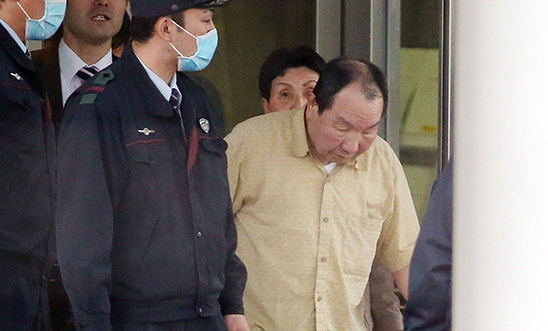
Hakamada: Three days to guarantee his freedom

After more than 45 years on death row, 78-year-old Hakamada has been released from prison and granted a retrial, but he is still at risk.
How to take action
Please follow these instructions on how to leave a message for the Shizuoka District Prosecution Office urging them not to file an appeal. Don't be put off that the website is in Japanese. This is a crutial moment and you can make a real difference.
Tip: If you use Google's Chrome browser it can translate the page for you.
Go to the feedback page for the Shizuoka District prosecution. To open the link in a new window, hold down the Ctrl key on your keyboard and click on the link.
Then follow the instructions below.
- Enter the subject of your message in the first blank box (題名), e.g. “Hakamada case”.
- Enter your message in the second box (内容). This needs to be less than 1,000 characters.
- Enter your name in the third box (氏名).
-
Enter your name again in the fourth box (ふりがな).
Do not fill out any further boxes. - Click on the left button (記入内容の確認) which will take you to the next page.
- Finally, click on the left button at the bottom (送信).
When you have completed these steps, you will see confirmation that your message has been sent.
Sample message
Feel free to use the following text for your message, or create your own.
Dear Tetsuo Nagano,
Following the decision by the Shizuoka District Court to grant Hakamada Iwao a retrial, I urge you not to file an immediate appeal.
In light of the new evidence that has emerged related to Hakamada's case, and taking into account his claims that he was coerced into signing a confession during the initial interrogation in 1966, it is vital that the case is re-examined. As Hakamada is now elderly, and in poor health as a result of his many years in prison, the retrial must go ahead without delay.
Yours respectfully and sincerely,
[Your Name]
Sample message (Japanese)
静岡地方検察庁 検事正 長野哲生様
拝啓 静岡地裁の再審開始の決定をうけとめて、即時抗告をしないように要請します。
袴田事件に関する新証拠に照らし、また、1966年の逮捕当初の取調べから自白を強要されたとの袴田さんの主張を考慮すれば、この事件はもう一度審理をおこなうべきです。袴田さんは高齢であり、長期間の拘禁で健康状態も懸念されますので、速やかに再審を開始すべきです。
敬具
Background
Torture in detention
Sentenced on scant evidence
Retrial granted, but still in danger
Judge at Hakamada's trial believes he is innocent
'Since I had convicted him, I felt extremely guilty that I had to sentence and innocent man. I still do, to this day.'Kumamoto Norimichi
Kumamoto Norimichi was one of three judges on Hakamada’s case. Aged 28 at the time, he was the youngest of the judges and (in his words) 'for some reason, I was appointed to be the main associate judge… I had to write up the sentence at the end.'
'In cases where strong doubts exists over the guilt or innocence… If the prisoner is executed, the damage cannot be reversed.'
Not enough evidence to execute
‘Capital punishment may be imposed only when the guilt of the person charged is based upon clear and convincing evidence leaving no room for an alternative explanation of the facts.’UN Economic and Social Council (ECOSOC) Resolution 1984/50: Safeguards guaranteeing protection of the rights of those facing the death penalty (adopted May 1984)
According to Kumamoto Norimichi, no such evidence exists.